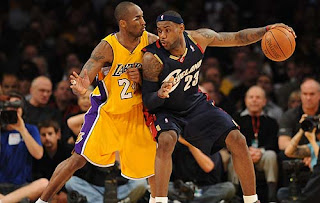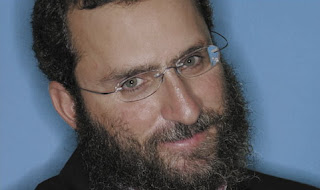Just as I was about to sit down and blog about Israel’s recent controversial ad campaign that (not-so-subtly) cautions Israelis living in the U.S. to not marry Americans, Israeli Prime Minister Benjamin Netanyahu has decided to scrap the campaign.
News of the ad campaign was first broken by the Jewish Channel but it went viral after Jeffrey Goldberg blogged about it on the Atlantic’s website. In addition to billboards in five major U.S. cities, the campaign by the Ministry of Immigrant Absorption also featured short videos that warn Israelis that raising their children in America will lead to a loss of Israeli identity. In one video an American man cannot understand why his Israeli girlfriend is sad and lighting a candle in their apartment (he doesn’t “get” that it’s Yom Hazikaron — Israel’s memorial day). In another video a pair of Israeli grandparents sit in front of a menorah and video chat with their granddaughter in America. When they ask the granddaughter to name the holiday they’re celebrating, she says “Christmas.”
 |
This Florida billboard is part of Israel’s recent ad campaign that the Prime Minister scrapped today.
Translation: Before “Abba” changes to “Daddy”… the time has come to return to Israel. |
Many American Jews were offended at the ad campaign and the Jewish Federations of North America (JFNA) formally protested it with their colleagues in Israel. In a memo re-posted on Jeffrey Goldberg’s blog, JFNA officials wrote:
This is to follow up on an earlier note from the JFNA Israel office concerning a new Israeli Ministry of Immigrant Absorption ad campaign attempting to lure ex-Israeli citizens home.
While we recognize the motivations behind the ad campaign, we are strongly opposed to the messaging that American Jews do not understand Israel. We share the concerns many of you have expressed that this outrageous and insulting message could harm the Israel-Diaspora relationship.
For that reason, we have made our concerns known to Israeli officials in the United States, and are delivering a strong letter to the Prime Minister’s office asking the government to stop this initiative and to reconsider the strategy behind it. We have also offered to help play a role in rethinking this effort.
Not everyone had a problem with the ad campaign. Laura Ben-David, an American Jew living in Israel, thought the ad campaign was right on target. She blogged about it saying:
Goldberg indignantly claims one who says ‘a Jew who is concerned about the Jewish future should live in Israel,’ is ‘archaic, and also chutzpadik.’ Archaic? Chutzpadik? I’m sorry, Mr. Goldberg, for being an archaic, chutzpadik Jew. Personally, I believe our chutzpah has served us well over the years. But really, do I have to explain that one? Jewish future in a Jewish homeland vs. Jewish future in a vastly overwhelmingly non-Jewish country… Tough one.
This is contempt for America? No, it is reality. We love America. Yes, I left, but I love and appreciate everything America stands for and what it has given to several generations of my family. It was my home. But it is not our Home. There is no place in the world that can replace Israel in the heart of the Jewish nation. But if one stays long enough it can replace Israel in one’s soul. Isn’t that worth placing a few ads and commercials?
In the end it turns out that Prime Minister Netanyahu decided this PR campaign was, well, bad PR for Israel so he had the Ministry of Immigration Absorption scrap it. Here is the statement coming out of Israel:
“The Ministry of Immigrant Absorption’s campaign clearly did not take into account American Jewish sensibilities, and we regret any offense it caused. The campaign, which aimed to encourage Israelis living abroad to return home, was a laudable one, and it was not meant to cause insult. The campaign was conducted without the knowledge or approval of the prime minister’s office or of the Israeli embassy in Washington. Prime Minister Netanyahu, once made aware of the campaign, ordered the videos immediately removed from YouTube, and he ordered that the billboards be removed as well. The prime minister deeply values the American Jewish community and is committed to deepening ties between it and the State of Israel.”
Unfortunately there is another story coming out of Israel that’s going to make for negative PR. Writing on the Daily Rabbi blog, Rabbi Reuven Hammer of Jerusalem explains that “Two different groups have recently begun to gather lists of stores and employers in Jerusalem who declare that they do not and will not hire Arabs. Their plan is to post and distribute these lists so that people will know which stores to patronize and which to avoid.”
This is clearly a form of racism and it cannot and should not be tolerated in Israel (or anywhere). I hope that Jewish groups like the JFNA work just as hard (or harder) to ensure that these groups cease and desist with their plan. Rabbi Hammer correctly points to a text from the Torah in Exodus that states, “message of the Torah is that “You shall not wrong a stranger [ger] or oppress him, for you were strangers in the land of Egypt.”
Israel gets attacked in the media enough without having to cause her own PR nightmares. Let’s hope that this ill conceived plan ends immediately since it is in direct contradiction with Israel’s democratic ideals as well as the values of Judaism.
(c) Rabbi Jason Miller | http://blog.rabbijason.com | Twitter: @RabbiJason | facebook.com/rabbijasonmiller







